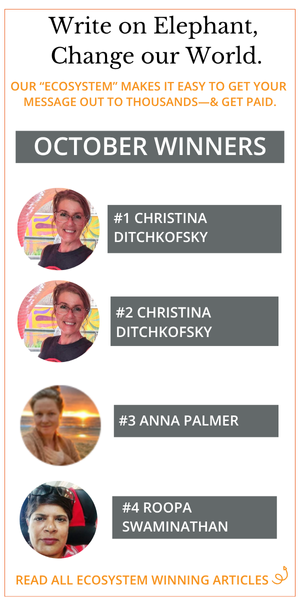View this post on Instagram
“In the tapestry of life we are all connected. Each one of us is a gift to those around us, helping each other to be who we are. Weaving a perfect picture together.” ~ Anita Moorjani
~
Woke. Oh, woke.
When I hear the word, I think of a sentiment similar to the beautiful quote above from author Anita Moorjani. The idea that each of us has something of value within that is important to share with others and our planet.
I’m also here to break it down, take it apart, and put it back together. But before I do, what is the literal definition of “woke”? And how do we cope if we find ourselves fitting that definition?
Merriam-Webster tells us this word serves as the past tense and past participle of “wake.” As of 2017, that became the secondary definition of the word. Today, the dictionary’s primary definition of “woke” is:
“a : aware of and actively attentive to important societal facts and issues (especially issues of racial and social justice) {often used in contexts that suggest someone’s expressed beliefs about such matters are not backed with genuine concern or action}
b : reflecting the attitudes of woke people disapproving : politically liberal or progressive (as in matters of racial and social justice) especially in a way that is considered unreasonable or extreme”
That’s the funny thing about words. When we keep using them over and over in other contexts, they become real. Straight into history they go, where generations to come will wonder what “woke” really meant and why great grandpa was always so mad about a “woke virus.”
And one day they’ll come to find that woke people cared about others outside their immediate circle. That to not be woke would mean to be asleep. Therefore, if you’re not woke to important societal facts and issues, you’re dead asleep to them.
Then there’s the added layer of those who despise the ones who have awoken. The ones who spent time worrying that the “woke virus” was taking over the world, although the opposite was true. The woke ones were desperately trying to get others to wake up, to eradicate the virus of misinformation so that everyone would thrive—even the sleepy ones.
I see this idea the way I do because I have been uncomfortably woke since before I can remember. Uncomfortable because of the world we’re in. But otherwise, it’s always made perfect sense.
How do I know I was a woke toddler? I lost my grandmother when I was two years old. Her Bridge Club friends took over deciding the funeral date but couldn’t agree on one. With me on my momma’s hip over a two week period, she would go to the viewing room and cry over her.
She told me that I eventually grabbed her cheeks, patted them softly, and said, “No, no, no, Momma. She not there. She here,” motioning to the sky and all around. Seeing and feeling deeply have been a part of my life before anything else was.
I’m beginning to realize more everyday that most all of my life experiences challenge many of today’s arguments, operating on the core belief that everything we go through prepares us for something important to come. The acts of kindness we receive or give create a ripple effect of good.
It’s seeing what happens when someone close to you is struggling and finally gets what they need to thrive. It’s feeling that same struggle yourself. It’s the burst of growth when you turn inward and find your alignment. I’m certain you can relate. If you can’t, I can probably assume you haven’t read this far and I might have lost you at “woke.”
However you may feel about the word, it’s always helpful to take an argument and disassemble it. That is, if you’re really wanting to get into the root cause and find a solution.
What do “woke” people really want? What is the actual agenda?
As someone who took Diversity, Equity & Inclusion (DEI) training frequently for my career, I have the insider scoop. A little piece of what DEI programs teach us. Something that has gifted me with a way to simplify what we’re really after.
Through my DEI training, I learned that true societal progress is more than just changing laws or policies. It’s about addressing the core needs of the individual—and I watched so many of the individuals I led grow and thrive when I applied the principles I was fortunate to learn.
Which brings me to Dr. Peggy Swarbrick’s “Eight Dimensions of Wellness”—a framework that aims to support every aspect of a person’s well-being. What it takes for each person to reach their fullest potential. What creates an imbalance that leads them down the wrong path.
The ability to fulfill all of them can be tricky, but it’s easier to do so when it’s all laid out. So, let’s dive in to the Eight Dimensions of Wellness:
Physical Wellness: Access to healthcare and fresh food—making certain that food deserts do not exist, and ensuring everyone has what they need to stay healthy.
Emotional Wellness: The ability to manage emotions through skills learned from childhood, therapy, and healthy coping mechanisms.
Intellectual Wellness: The freedom to pursue what intellectually stimulates you, whether that’s conversation, reading, writing, music, art, or sharing ideas.
Social Wellness: The presence of a supportive community—a village that’s there for you.
Spiritual Wellness: The ability to acknowledge something greater than yourself, whether that’s through religion, agnosticism, or other forms of belief.
Occupational Wellness: Access to opportunities that allow for career growth and financial independence, including pathways through education and job access.
Environmental Wellness: A peaceful environment that provides a sense of belonging and stability.
Financial Wellness: The ability to provide for yourself in any circumstance, with the support and resources to navigate tough times.
The truest definition of “woke”? Wanting all eight of these pillars for every one of us.
In theory, these eight basic principles swirled together in one human being is what creates stability. This is what creates an individual who can support their community to the fullest, without stifling someone at their core when who they are isn’t hurting anyone else.
This framework isn’t just about self-improvement—it’s a blueprint for collective growth and resistance. Because joy, in its purest form, is a powerful act of defiance in today’s world.
This is the framework we need to focus on to allow joy to seep in despite the chaos.
It’s also the framework we should offer to others when we have the capacity to help—when someone else is lacking one or more of these dimensions.
The time is now, more than ever, when we must grow and protect our energy, our essence, our collective core.
We’re all looking for change, yearning and screaming for something to shift. But more and more, the change starts with us. It’s always been up to us, yet we waver when it comes to standing in our power.
I can’t tell you what it looks like to fulfill your personal dimensions, but I can tell you that going back to basics will never hurt. In fact, it will always help.
Breath. Unclench your jaw. Drop your shoulders. Meditate. Or if that’s not your thing, lie on the floor for a good while. Deliver cookies to a loved one. Eat the cookies, because you are your very own loved one. Whatever going back to basics looks like for you, do that.
As life feels more and more overwhelming, prioritize your own Eight Dimensions of Wellness. Give yourself grace for the ones that may be out of your reach right now—it’s by design. And one day, we may see a world where this framework is at the center of how we operate.
Until that time comes, as our dimensions seem scattered and disordered, as we feel guilt for every single thing we may have and struggle for every thing we may need, we will grow stronger and more resilient by collecting and refining them to the best of our abilities.
Just remember, it’s okay if some days you can only stand barefoot in the grass. After all, it’s what all the woke people do: touch the grass, brush ourselves off, and make waves.
Keep making those waves—giving up is not an option. Persevering is mandatory.
~
“Courage is not the absence of fear, but rather the judgement that something else is more important than fear.” ~ Ambrose Redmoon
~


 Share on bsky
Share on bsky




Read 4 comments and reply